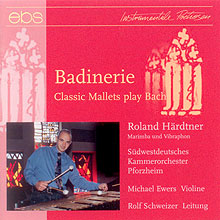Badinerie

P & C 2000
Total playing time: 77´25 Min.
Arrangements of Johann Sebastian Bach's compositions for mallet instruments and orchestra.
CD-Order: cd-bestellung@roland-haerdtner.com
Content
Johann Sebastian Bach
- Italienisches Konzert F-Dur BWV 971
1. Allegro moderato
2. Andante
3. Presto - Air aus der Overtüre Nr. 3 BWV 1068
4. Air - Konzert a-Moll BWV 1041
5. Allegro
6. Andante
7. Allegro assai - Siciliano aus der Sonate BWV 1031
8. Siciliano - Konzert d-Moll BWV 1060
9. Allegro
10. Andante
11. Allegro assai - Allegro aus der Sonate BWV 1033
12. Allegro - Ouvertüre Nr.2 h-Moll BWV 1067
13. Ouvertüre
14. Rondeau
15. Sarabande
16. Bourée I et II
17. Polonaise
18. Menuet
19. Badinerie - Zwei Chorale aus der Matthäuspassion
20. Befiel du deinen Weg BWV 244
Der Leib zwar in der Erden BWV 161
Instrumentalists:
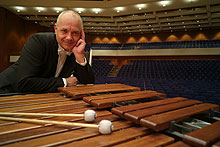 Roland Härdtner - Marimba, Vibraphon
Roland Härdtner - Marimba, Vibraphon
Information about Roland Härdtner's musical career can be found under "biographie".
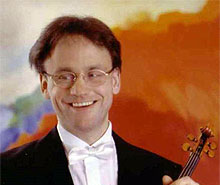 Michael Ewers - Violine
Michael Ewers - Violine
Michael Ewers was born in 1969 in Sindelfingen. He started his musical career at the age of eight. For multiple times he was award winner at the „Wettbewerb des Deutschen Tonkünstlerbandes“ and at „Jugend Musiziert“ (Young Musician). In 1988 he became awarded with the first price of the „Carl-Flesch-Akademie“ in Baden-Baden.
Already before his studies he collected experience with an orchestra as a longtime first concertmaster of the „Landesjugendorchester Baden-Württemberg“ and of the „Sinfonieorchester des Schleswig-Holstein-Musikfestivals“ under Sergiu Celibidache, later also at the “Radio-Sinfonie-Orchester Stuttgart“.
Seit 1. Februar 2000 ist er koordinierter Konzertmeister des Südwestdeutschen Kammerorchesters.
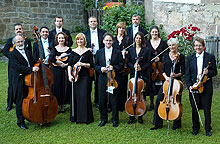 Südwestdeutsches Kammerorchester Pforzheim
Südwestdeutsches Kammerorchester Pforzheim
The signs of the „Südwestdeutsches Kammerorchester Pforzheim“ are a stylistic variety from the old to the new music.and a fresh and tackling access to music.The ensemble has 14 musicians from seven nations and is one of the rare „fulltime chamber orchestras“. Therefore it is possible to achieve an enormous homogeneity and flexibility of the body of sound.
The orchestra was founded in 1950 by Friedrich Tilegant, a pupil of Hindemith.
The ensemble found quick international appreciation and soon it could be heard at the festivals of Salzburg, Luzern and Leipzig together with musical experts like Maurice André, Dietrich Fischer-Dieskau and Yehudi Menuhin.
The „Südwestdeutsche Kammerorchester“ recorded over 200 records and CDs and made numerous radio-recordings on its way to success. Also today it works together with soloists of an international reputation, like Gidon Kremer, Mischa Maisky, Frank Peter Zimmermann or Sabine Meyer. It toured a lot of Europe (Schleswig-Holstein-Musikfestival, Schwetzinger Festspiele, Prager Frühling, Flandern-Festival, Festival Euro Mediterraneo Rom, OsterKlang Wien) the USA and Japan.
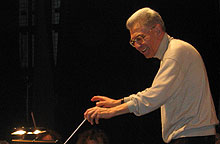 Rolf Schweizer - Dirigent
Rolf Schweizer - Dirigent
Rolf Schweizer was born in Emmendingen (Baden) in 1936. He studied
church music in Heidelberg (with Poppen, Fortner, Zimmermann, Haag and
Dallmann). Whilst still at the university, he became choirmaster and
organist at the Johanniskirche Mannheim. He stayed there for 10 years as
a full-time church musician.
Since 1966 he has been ‚Bezirkskantor’ of the region of Pforzheim, and
choirmaster and organist at the ‚Stadtkirche’, Pforzheim. In 1969 he was
appointed ‚Kirchenmusikdirektor’, in 1975 ‚Landeskantor’ of
Mittelbaden. Rolf Schweizer has received considerable recognition, not
only as a choirmaster, particularly in the field of child and youth
choirs, but has
also been in demand as a church composer for many years, composing
hymns, trombone ensemble, choralmusic, cantata, oratorio, orchestral
music and organ works.
In 1984 Rolf Schweizer was appointed ‚Professor’ by the state of
Baden-Württemberg. In 1991 he received the ‚Ehrenring’ of the town of
Pforzheim and in 1998 he became freeman of the town in which he has been
working for over three decades. He has been guest lecturer at numerous
Music Academies in entire Germany.
Since 2001 Rolf Schweizer has been working freelance as a referent, conductor and composer.
Info
Johann Sebastian Bach wrote compositions for all instruments of his time. So, the late-baroque musician was able to understand the way of playing different kinds of instruments. However, the question arises rightly, if Bach's oevre should be exclusively played on the instruments of the 18th century. It is known, that the composer was curious about all news from the instrument makers to use new instruments effectivly compositional. Long since there are adaptions of Bach's music for brass players, synthesizer, modern big orchestra and a lot of other instrumentations.
Bach 's notation was carefully observed in this arrangements, but where the string orchestra takes over the function of the basso continuo with the corresponding chords, the notation was added in Bach's style.
Although it is known that Johann Sebastian Bach was able to compose very sensitively for the specific solo instruments, it is clearly noticeable in this recording that the take-over of the solo voice by the marimba or the vibraphone does not blur the structures of Bach's music, in fact it comes to light even more, especially in the rhythm section.
However, the CD „Badinerie“ doesn't
want to provoke a confrontation regarding the for and against of the
instrumentation of Bach's compostions, but rather to offer other
aspects of listening to Bach's music to „nosy ears“.
Johann
Sebastian Bach has a strong emanation in every instrumentation, based
on his polyphonic worked-throug movement and his consistent
alignment. Therefore it can be expected, that the „Klangrede of
Bach“ can be noticed again and unexpected also in this
instrumentation.













